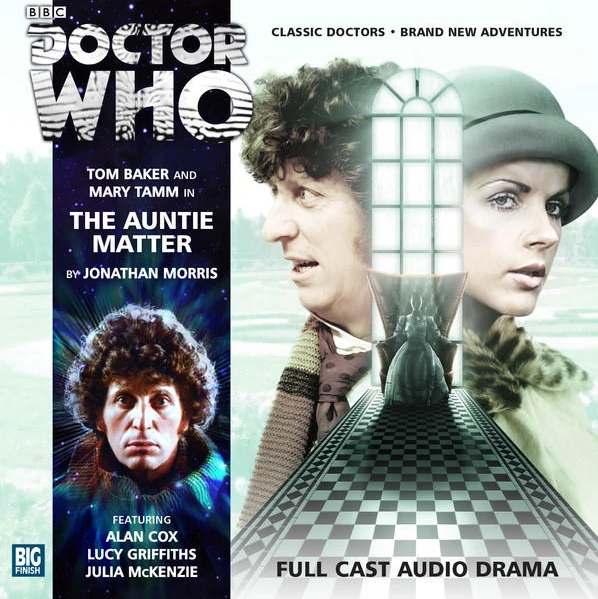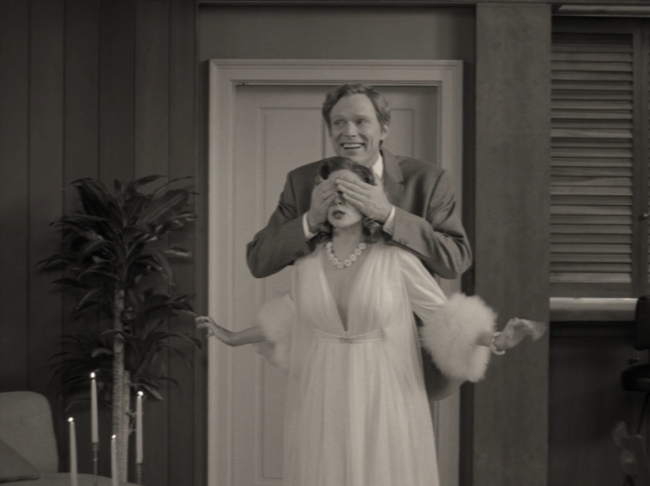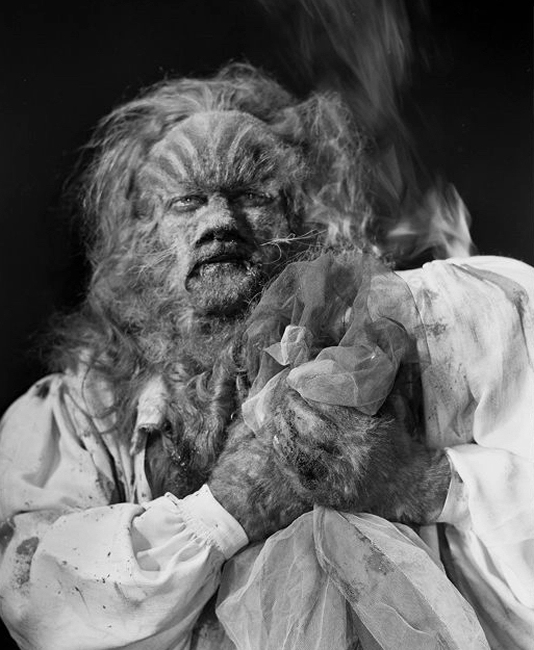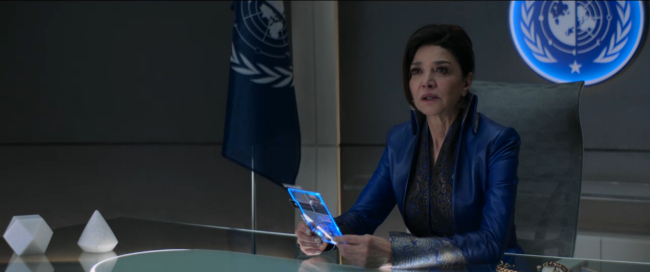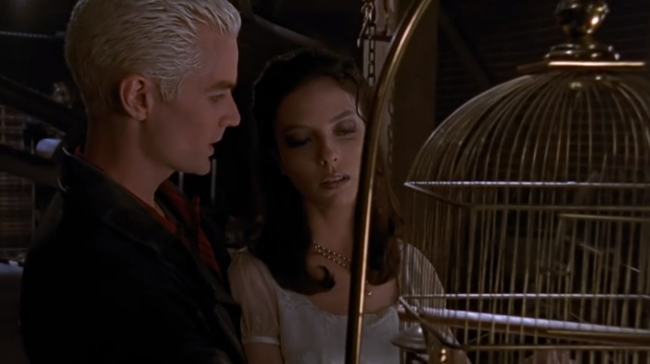
A cocky young man decides he's too good for his job as an assistant pig keeper, even if that pig is an oracle--or "oracular"--pig. He sets off to save the world and a princess along the way in Disney's 1985 animated film The Black Cauldron. The first such film to be produced without any of the "Nine Old Men" doing the animation--though Milt Kahl came out of retirement to do uncredited character design--it was an infamously troubled production. Based on a Tolkien knock-off series called The Chronicles of Prydain by Lloyd Alexander, it joined a host of other Tolkien imitators filling screens and pages in the 1980s' fantasy boom. Disney's film differs significantly from the source material, though, in some ways improving it but in most ways diminishing it. Which is certainly not to say the books are masterpieces.
I find my 2017 review still squares with my current opinion of the film and covers a lot of ground I won't retread. But since then I have read the first book in the Prydain series so I'll mainly be talking about some of the differences between the source and adaptation to-day.

I guess if you've grown tired of reading Lord of the Rings over and over, picking up one of its countless imitators is a valid choice (I've always been partial to Dragonlance myself). The first book from the Chronicles of Prydain begins, like Lord of the Rings, with a protagonist in a relatively humble station of life. The pig really acts as a version of the One Ring, a McGuffin which the protagonist underestimates the value of and which draws him to centre stage in world events.

Disney's film does a better job of establishing Taran (Grant Bardsley) as a character by giving him some silly scenes, stumbling about as he shows off for the pig. The book starts more heavily on tedious infodumps. Tolkien, of course, is known for having paragraphs of exposition but one of the reasons The Lord of the Rings succeeds so well is that the exposition it starts with, about Hobbits, is so charming. It's populated by colourful characters with amusing names. Taking influence, perhaps, from Tolkien's expertise as a linguist, Lloyd Alexander models most of his fantasy names on Welsh. Which is interesting but not quite as charming as Brandybuck or Proudfoot (Proudfeet).
Giving Taran some scenes being awkward humanises him. Disney's film version also feels a bit influenced by Luke Skywalker. He even gets a glowing, magic sword.
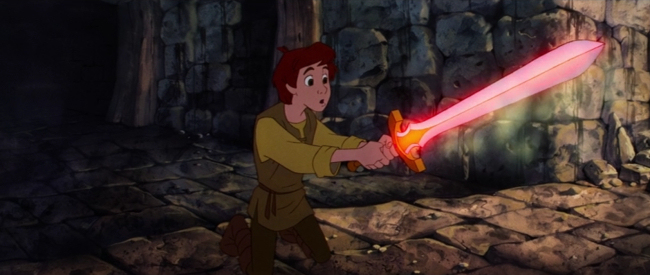
In fact, it's the Princess Ellonwy who gets the sword in the book, not Taran. As in the film, it's taken from a king's tomb but in the book its enchantment prohibits anyone but people with royal blood from using it. Taran nearly fries himself when he tries.
Ellonwy in the book is a redhead, not a blonde, and her fractious, teasing personality is more of a tsudere layer than in the film. By this point, I'm used to Disney making its young female leads less interesting than in their source materials--that goes for Alice, Wendy, Aurora, Perdita, and Bianca with Cinderella being the exception.

Ellonwy, voiced by Susan Sheridan, is also poorly animated in the film. Both she and Taran show the absence of the Old Men. They move around a lot, so the effort is there, but few of their movements look human or evocative. The film fares better with more exaggerated, cartoonish characters, like Gurgi (John Byner) and Fflewddur Fflam (Nigel Hawthorne). Fflewddur is an altogether broader character than he is in the book but, considering the minor role he occupies, that may be for the best.
The film removes a significant character, essentially the book's Aragorn with a dose of Gandalf and Ivanhoe. Gwydion is a prince Taran meets in the woods early on. Much as Tolkien found himself obliged to get Gandalf out of the way so he'd stop making things too easy for his adventurers, Gwedion gets swept aside before too long but his presence explains a lot that doesn't make any sense in the film, most notably Gurgi.

In my last review of the film, I wondered what Gurgi was, why Gurgi attaches himself to Taran, and above all, why no-one in the film asked these questions. The book gave me my answers--in the book, Gurgi is much more humanoid, making it natural Taran doesn't ask what he is immediately, but he does eventually and Gwydion explains how Gurgi is a being who believes himself more evil than he is. The implication is that he's gone mystically feral somehow but for the most part his nature is still shrouded in mystery--which is fine. But it doesn't make sense for Taran not to wonder.
The book also provides a reason for Gurgi to be there in the first place--he's an old follower of Gwydion. When Gwydion disappears, Gurgi naturally transfers loyalty to Taran, after Gwydion made it clear how important Taran was. But how important is Taran, really?
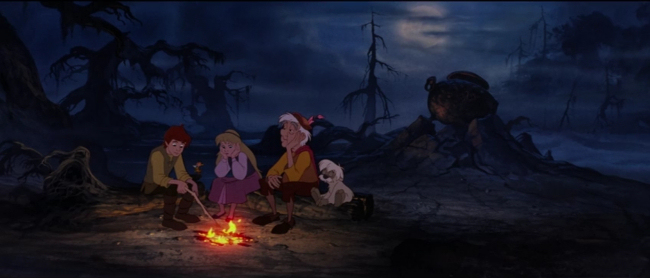
In Disney's film, Ellonwy points out Taran was only useful in their escape from the castle because of his new sword. After this, it's debatable whether anything Taran does is of use. He trades the sword for the Black Cauldron but no-one stops to ask if that's a good idea. They want to stop the Cauldron from ending up with the Horned King (John Hurt) but are Taran and his friends really better equipped to keep it safe than the witches who seem able to stash it in purple ether?
In the book, Taran gradually starts to take on a leadership role by making more mature decisions than Ellonwy, who can't seem to outgrow her petulance. Part of this gradual process is her barely repressed, growing admiration for Taran. The relationship between the two is a surprisingly subtle rendering of a teenage romance and one of the best features of the book. It's a shame it's basically absent from the film.
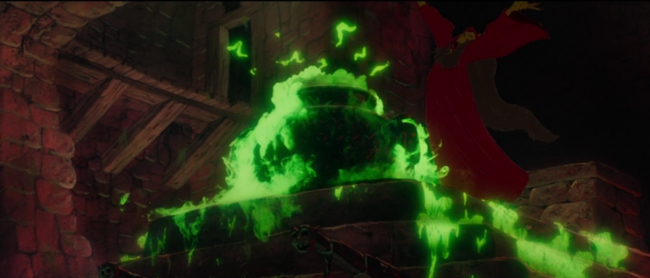
It remains a visually interesting misfire with a captivating villain in John Hurt's Horned King but The Black Cauldron is certainly not the film that brought Disney out of its slump.
The Black Cauldron is available on Disney*.
Twitter Sonnet #1435
The spider paint conducts a living silk.
The timing builds a perfect score from string.
The fluffy cakes were poured from turnip milk.
The searchers shunned aggressive spots from Bing.
A braggart built a chicken out of clams.
The biggest bowl could never crack for beets.
The raging brook was babb'ling 'bout the dams.
The wonder's drained beyond electric beats.
The query burns in rounded, brainy hair.
The walking dog relinquished bills for lips.
A set of coins became a ringing care.
Behind the table something softly sips.
The sooty iron trapped the schnauzer man.
The greater pizza rode the thicker pan.



